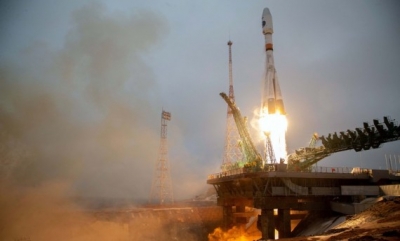Russia’s launch "Arktika-M", observation satellite on Sunday is part of President Vladimir Putin’s energetic effort to fully develop the Russian Far East, tapping the vast mineral resource of the Arctic region.
India is likely to benefit from the move which could speed up the development of the Far East, where New Delhi stands invested.
Russia's space corporation Roscosmos said that a Soyuz-2.1b B carrier rocket blasted off with the "Arktika-M" satellite from Kazakhstan's Baikonur Cosmodrome on Sunday.
“Arktika-M” will provide continuous surveillance of the northern region of Russia and the sea of the Arctic Ocean, Roscosmos added.
The satellite will transmit observational images of the Earth's North Polar region and surrounding areas at least every 15-30 minutes.
In Putin’s broader vision, India is part of the rise of the Russian Far East, which will have the port city of Vladivostok as its fulcrum.
Russia’s interest in monitoring the Arctic is not hard to gauge. For Moscow, its future as an energy superpower is in the Arctic. Over 80 percent of its gas and 70 percent of its oil reserves are in the Arctic regions, and 30 percent and 12 are on the continental shelf.
Two-third of these resources is located in Russia ‘s western Arctic, in the Barents and Kara Seas, and in the Timan-Pechora basin, with contains about 8.2 billion tons of hydrocarbons. Major possible fields also exist in the Okhotsk Sea, on the Kamchatka Peninsula, and in the Laptev Sea. Minor oil and gas deposits have been discovered in the onshore territories near the Bering Sea. Russia ‘s Ministry of Natural Resources states that the country‘s Arctic contains around 80 billion tons of hydrocarbon deposits or 586-billion-barrel oil equivalent, according to a monograph titled: The Kremlin’s Arctic Dreams. Geo-Strategic Implications for Russia and the World in 2040. The Ministry for Industry and Energy calculates that Russia could be extracting upwards of 110 million tons of oil and 160 billion cubic meters (bcm) of gas from the Arctic shelf by 2030.
India is in sharp Russian focus in the development of that Arctic, a subset for the development of the Far East region.
During a recent visit to Moscow, India’s Foreign Secretary, Harsh Shringla repeated India’s deep interest in Russian Far East, a region which President Vladimir Putin wants to develop as a signature initiative. "We see that as a very high potential area, where we can develop new sectors and help companies looking to invest in new areas such as coking coal, timber, liquid natural gas," he said during an address to the Russian Diplomatic Academy. "There is huge potential there."
During a 2019 visit to the Far Eastern port city of Vladivostok, Prime Minister Narendra Modi announced that New Delhi would pitch in a $1 billion loan to foster the region's development. He also signed a memorandum to anchor a direct maritime corridor between Vladivostok and Chennai. Unlike the European sea route which takes 40 days, the new corridor will consume only 24 days.




















